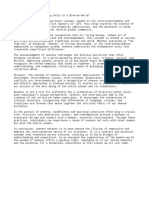Essay 2
Essay 2
Uploaded by
movieexclusive020 ratings0% found this document useful (0 votes)
11 views1 pageThe document discusses the importance of environmental sustainability. It defines sustainability as meeting present needs without compromising future generations' ability to meet their own needs. This requires striking a balance between economic development, social equity, and environmental preservation. The rapid exploitation of natural resources has led to problems like pollution, deforestation and loss of biodiversity. Adopting sustainable practices through renewable energy, reducing waste, and sustainable agriculture is necessary for the planet's survival. Education is key to fostering a collective commitment to preserving the environment.
Original Description:
Copyright
© © All Rights Reserved
Available Formats
TXT, PDF, TXT or read online from Scribd
Share this document
Did you find this document useful?
Is this content inappropriate?
Report this DocumentThe document discusses the importance of environmental sustainability. It defines sustainability as meeting present needs without compromising future generations' ability to meet their own needs. This requires striking a balance between economic development, social equity, and environmental preservation. The rapid exploitation of natural resources has led to problems like pollution, deforestation and loss of biodiversity. Adopting sustainable practices through renewable energy, reducing waste, and sustainable agriculture is necessary for the planet's survival. Education is key to fostering a collective commitment to preserving the environment.
Copyright:
© All Rights Reserved
Available Formats
Download as TXT, PDF, TXT or read online from Scribd
Download as txt, pdf, or txt
0 ratings0% found this document useful (0 votes)
11 views1 pageEssay 2
Essay 2
Uploaded by
movieexclusive02The document discusses the importance of environmental sustainability. It defines sustainability as meeting present needs without compromising future generations' ability to meet their own needs. This requires striking a balance between economic development, social equity, and environmental preservation. The rapid exploitation of natural resources has led to problems like pollution, deforestation and loss of biodiversity. Adopting sustainable practices through renewable energy, reducing waste, and sustainable agriculture is necessary for the planet's survival. Education is key to fostering a collective commitment to preserving the environment.
Copyright:
© All Rights Reserved
Available Formats
Download as TXT, PDF, TXT or read online from Scribd
Download as txt, pdf, or txt
You are on page 1of 1
Certainly! Let's explore the theme of environmental sustainability.
Title: "Harmony with Nature: Embracing Environmental Sustainability"
In a world grappling with the consequences of climate change and environmental
degradation, the concept of environmental sustainability has emerged as a beacon of
hope. This essay delves into the importance of living in harmony with nature,
understanding the principles of sustainability, and the collective responsibility
we bear to safeguard the planet for future generations.
Environmental sustainability revolves around the idea of utilizing Earth's
resources in a way that meets present needs without compromising the ability of
future generations to meet their own needs. At its core, sustainability seeks to
strike a delicate balance between economic development, social equity, and
environmental preservation. It recognizes the interconnectedness of all living
things and the delicate equilibrium that sustains life on our planet.
The rapid industrialization and unchecked exploitation of natural resources have
led to alarming environmental consequences. Deforestation, pollution, and the
depletion of biodiversity are among the pressing issues that demand our attention.
Adopting sustainable practices is not merely an option; it is an imperative for the
survival of our planet.
One key aspect of environmental sustainability is the promotion of renewable energy
sources. Transitioning from fossil fuels to cleaner, renewable alternatives such as
solar, wind, and hydroelectric power is crucial for reducing carbon emissions and
mitigating climate change. Embracing sustainable energy practices not only
safeguards the environment but also fosters innovation and economic growth in the
burgeoning green technology sector.
Additionally, responsible consumption and waste management play pivotal roles in
promoting sustainability. Adopting a circular economy, where resources are reused,
recycled, and repurposed, minimizes the ecological footprint of human activities.
The shift towards sustainable agriculture practices, emphasizing organic farming
and conservation of soil health, further contributes to environmental well-being.
Education and awareness are vital components in the journey towards sustainability.
Encouraging individuals, communities, and businesses to make informed choices about
their ecological impact fosters a collective commitment to preserving the
environment. Governments, non-governmental organizations, and the private sector
must collaborate to implement policies and initiatives that promote sustainability
on a global scale.
In conclusion, embracing environmental sustainability is not a choice but a
necessity in our quest for a balanced and resilient planet. It requires a holistic
approach that considers the interconnectedness of ecological, social, and economic
systems. By adopting sustainable practices, we can pave the way for a future where
humanity coexists harmoniously with nature, ensuring a legacy of health and
abundance for generations to come.
You might also like
- The Subtle Art of Not Giving a F*ck: A Counterintuitive Approach to Living a Good LifeFrom EverandThe Subtle Art of Not Giving a F*ck: A Counterintuitive Approach to Living a Good LifeRating: 4 out of 5 stars4/5 (5866)
- The Gifts of Imperfection: Let Go of Who You Think You're Supposed to Be and Embrace Who You AreFrom EverandThe Gifts of Imperfection: Let Go of Who You Think You're Supposed to Be and Embrace Who You AreRating: 4 out of 5 stars4/5 (1094)
- Never Split the Difference: Negotiating As If Your Life Depended On ItFrom EverandNever Split the Difference: Negotiating As If Your Life Depended On ItRating: 4.5 out of 5 stars4.5/5 (866)
- Grit: The Power of Passion and PerseveranceFrom EverandGrit: The Power of Passion and PerseveranceRating: 4 out of 5 stars4/5 (597)
- Hidden Figures: The American Dream and the Untold Story of the Black Women Mathematicians Who Helped Win the Space RaceFrom EverandHidden Figures: The American Dream and the Untold Story of the Black Women Mathematicians Who Helped Win the Space RaceRating: 4 out of 5 stars4/5 (909)
- Shoe Dog: A Memoir by the Creator of NikeFrom EverandShoe Dog: A Memoir by the Creator of NikeRating: 4.5 out of 5 stars4.5/5 (543)
- The Hard Thing About Hard Things: Building a Business When There Are No Easy AnswersFrom EverandThe Hard Thing About Hard Things: Building a Business When There Are No Easy AnswersRating: 4.5 out of 5 stars4.5/5 (352)
- Elon Musk: Tesla, SpaceX, and the Quest for a Fantastic FutureFrom EverandElon Musk: Tesla, SpaceX, and the Quest for a Fantastic FutureRating: 4.5 out of 5 stars4.5/5 (474)
- Her Body and Other Parties: StoriesFrom EverandHer Body and Other Parties: StoriesRating: 4 out of 5 stars4/5 (824)
- The Emperor of All Maladies: A Biography of CancerFrom EverandThe Emperor of All Maladies: A Biography of CancerRating: 4.5 out of 5 stars4.5/5 (272)
- The Sympathizer: A Novel (Pulitzer Prize for Fiction)From EverandThe Sympathizer: A Novel (Pulitzer Prize for Fiction)Rating: 4.5 out of 5 stars4.5/5 (122)
- The Little Book of Hygge: Danish Secrets to Happy LivingFrom EverandThe Little Book of Hygge: Danish Secrets to Happy LivingRating: 3.5 out of 5 stars3.5/5 (411)
- The Yellow House: A Memoir (2019 National Book Award Winner)From EverandThe Yellow House: A Memoir (2019 National Book Award Winner)Rating: 4 out of 5 stars4/5 (98)
- The World Is Flat 3.0: A Brief History of the Twenty-first CenturyFrom EverandThe World Is Flat 3.0: A Brief History of the Twenty-first CenturyRating: 3.5 out of 5 stars3.5/5 (2268)
- Devil in the Grove: Thurgood Marshall, the Groveland Boys, and the Dawn of a New AmericaFrom EverandDevil in the Grove: Thurgood Marshall, the Groveland Boys, and the Dawn of a New AmericaRating: 4.5 out of 5 stars4.5/5 (268)
- A Heartbreaking Work Of Staggering Genius: A Memoir Based on a True StoryFrom EverandA Heartbreaking Work Of Staggering Genius: A Memoir Based on a True StoryRating: 3.5 out of 5 stars3.5/5 (232)
- Team of Rivals: The Political Genius of Abraham LincolnFrom EverandTeam of Rivals: The Political Genius of Abraham LincolnRating: 4.5 out of 5 stars4.5/5 (235)
- On Fire: The (Burning) Case for a Green New DealFrom EverandOn Fire: The (Burning) Case for a Green New DealRating: 4 out of 5 stars4/5 (74)
- The Unwinding: An Inner History of the New AmericaFrom EverandThe Unwinding: An Inner History of the New AmericaRating: 4 out of 5 stars4/5 (45)
- The Effect of Erodent Particle Hardness On The Erosion of Stainless SteelDocument6 pagesThe Effect of Erodent Particle Hardness On The Erosion of Stainless SteelMouna KallelNo ratings yet
- Online WordpadDocument1 pageOnline Wordpadmovieexclusive02No ratings yet
- Online WordpadDocument1 pageOnline Wordpadmovieexclusive02No ratings yet
- Online WordpadDocument1 pageOnline Wordpadmovieexclusive02No ratings yet
- Online WordpadDocument1 pageOnline Wordpadmovieexclusive02No ratings yet
- Online WordpadDocument1 pageOnline Wordpadmovieexclusive02No ratings yet
- Simple Harmonic MotionDocument7 pagesSimple Harmonic MotionRaju SinghNo ratings yet
- Geohazards Eeg 454Document114 pagesGeohazards Eeg 454saleh ehmouda99No ratings yet
- Charles Darwin: (Contribution To Science, Society and Technology)Document2 pagesCharles Darwin: (Contribution To Science, Society and Technology)Edhel CabalquintoNo ratings yet
- Design ProjectDocument239 pagesDesign Projectnutac127No ratings yet
- Me6301 Engineering Thermodynamics Nov Dec 2014.Document3 pagesMe6301 Engineering Thermodynamics Nov Dec 2014.BIBIN CHIDAMBARANATHANNo ratings yet
- Objectives and Plan For Igcse PhysicsDocument17 pagesObjectives and Plan For Igcse PhysicsCarole ThamiNo ratings yet
- Werner Smykatz-Kloss & Peter Felix-Henningsen - Palaeoecology of Quaternary DrylandsDocument251 pagesWerner Smykatz-Kloss & Peter Felix-Henningsen - Palaeoecology of Quaternary DrylandsPopolvuh89No ratings yet
- EPRI Combustion Turbine Experience and Intelligence ReportDocument188 pagesEPRI Combustion Turbine Experience and Intelligence ReportPenjual Air100% (3)
- Phonons: 1. Solids in The Adiabatic ApproximationDocument28 pagesPhonons: 1. Solids in The Adiabatic ApproximationcampuspointNo ratings yet
- Paper 2 Set B 24nov2009 KeyDocument14 pagesPaper 2 Set B 24nov2009 KeySHAMSIK2002No ratings yet
- Detail Project Report DPR 1MW Utility Scale Solar PV Power PlantDocument31 pagesDetail Project Report DPR 1MW Utility Scale Solar PV Power PlantSushakarNo ratings yet
- Water in The AtmosphereDocument4 pagesWater in The Atmospherenadamohey99No ratings yet
- ASSESSMENT OF Heavy Metal CADMIUM AND LEAD CONTAMINATION OF A PLAYGROUND SOIL OF L.E.A PRIMARY SCHOOLDocument47 pagesASSESSMENT OF Heavy Metal CADMIUM AND LEAD CONTAMINATION OF A PLAYGROUND SOIL OF L.E.A PRIMARY SCHOOLFeddy Micheal FeddyNo ratings yet
- Important Physics Book PDFDocument22 pagesImportant Physics Book PDFPrakash Singh50% (2)
- Research Paper Habitat A Proposed Mixed Use Commercial and Residential DevelopmentDocument15 pagesResearch Paper Habitat A Proposed Mixed Use Commercial and Residential DevelopmentAbigael Recio SolloranoNo ratings yet
- Wave ExerciseDocument6 pagesWave ExerciseIzzat FuatNo ratings yet
- Sci.5 Q4 W1Document9 pagesSci.5 Q4 W1Moier Kieth MarianoNo ratings yet
- Occult Signs and SymbolsDocument27 pagesOccult Signs and SymbolsMaurizio Barut100% (2)
- State of Matter: PHD Student Haithem N. Aldeen Department of PharmaceuticsDocument39 pagesState of Matter: PHD Student Haithem N. Aldeen Department of PharmaceuticshaithemNo ratings yet
- P3 Energy Work PowerDocument14 pagesP3 Energy Work PowerLindokunhle MabuzaNo ratings yet
- EE8703 RES Notes - CompressedDocument336 pagesEE8703 RES Notes - CompressedmanimaranNo ratings yet
- (G9) All QuestionsDocument11 pages(G9) All QuestionsJacky VandarNo ratings yet
- Quarter 2 Week 1 Activity 1: Mechanical Energy and WorkDocument4 pagesQuarter 2 Week 1 Activity 1: Mechanical Energy and WorkJ-heart Basabas MalpalNo ratings yet
- The Diagrams Below Show The Stages and Equipment Used in The Cement-Making Process, and How Cement Is Used To Produce Concrete For Building Purposes.Document3 pagesThe Diagrams Below Show The Stages and Equipment Used in The Cement-Making Process, and How Cement Is Used To Produce Concrete For Building Purposes.Minh PhuongNo ratings yet
- A. Matter and Energy: Physics by Farid AhmedDocument3 pagesA. Matter and Energy: Physics by Farid AhmedFarid AhmedNo ratings yet
- 1.1 Project Site ConditionsDocument30 pages1.1 Project Site ConditionsHarshad ShirsathNo ratings yet
- Tidal EnergyDocument8 pagesTidal EnergyRAJAGOPAL DNo ratings yet
- Ch01 SolutionDocument10 pagesCh01 Solutionapi-3700944No ratings yet
- MolesDocument18 pagesMolesApril Mae BaldozaNo ratings yet











































































